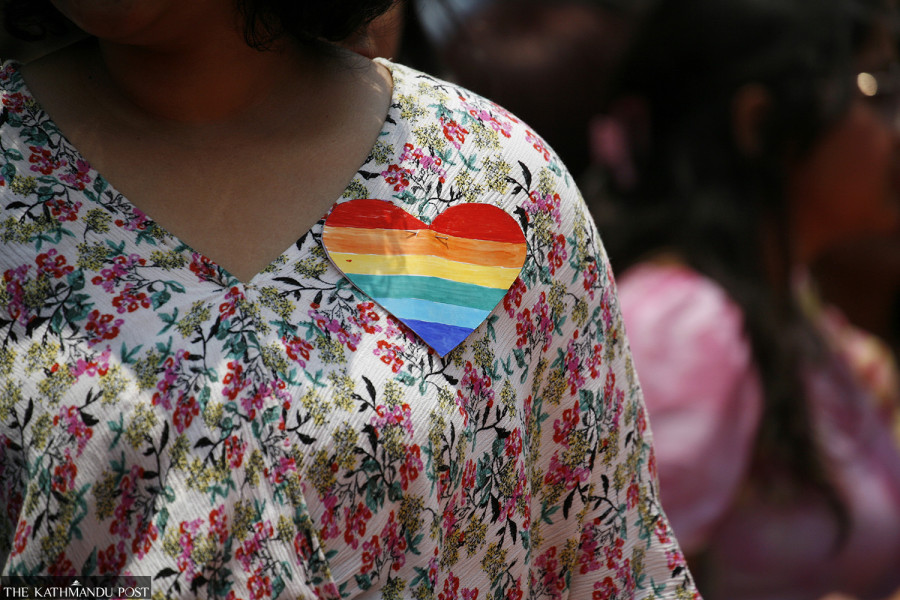Editorial
Curtailed queer rights
These rights go beyond sexuality and identity and include all aspects of human rights.
Nepal is ahead of many countries in LGBTQIA+ rights and policies. The Constitution of Nepal recognises gender and sexual minorities, which even developed countries like the US don’t explicitly mention. Moreover, the judiciary’s support for the rights of the queer community has increased in recent years. While these achievements seem noteworthy at the outset, there is still a huge disparity between the laws and the reality queer people face every day. In Nepal, while much of the activism for the rights of the LGBTQIA+ community still focuses on something as basic as identity and legal recognition, issues like the sexual and reproductive health rights (SRHR) of these communities remain overlooked. Although the Constitution of Nepal ensures fundamental rights, such as reproductive rights under the Safe Motherhood and Reproductive Health Act (2018) for gender and sexual minorities, these provisions haven’t effectively catered to the sexual and reproductive health of these communities.
The discrimination and stigma that gender and sexual minorities face daily manifests in their general inaccessibility of fundamental rights in Nepal. Programmes related to SRHR are usually associated with cisgender women and ignore LGBTQIA+ individuals. Queer folks are judged and ridiculed not just by their family members but also by the health staff at hospitals and health posts. This is problematic in a country where transgender people are forced to undergo surgery for medical verification to be legally recognised as “male” or “female”. Gender-affirming surgery requires medical professionals to follow certain clinical protocols; however, the existing law does not address gender reassignment.
In August, the Supreme Court made landmark progress in recognising LGBTQIA+ rights by ruling that Rukshana Kapali, a transgender woman, must be legally recognised as a woman on all documents without requiring medical verification; however, the law for legal recognition remains the same for all. So, these individuals have no option but to travel to India for surgeries, which can be expensive and unsafe. Moreover, transgender men, lesbians and bisexual individuals often struggle to access basic menstrual hygiene products and healthcare facilities related to safe motherhood and abortion. The path to having and parenting children is fraught with difficulties for queer individuals, as IVF and adoption facilities aren’t accessible. While surrogacy is legal for infertile married Nepali couples, it is prohibited for singles, transgender couples and foreign nationals.
Many people have the misconception that only cisgender women menstruate, but anyone with a uterus can experience it. These narratives arise through the limited awareness of our society and restrictive school curriculums. Such a perpetuation of false ideas further influences dominant ideas in popular platforms. Rarely do we see people from the LGBTQIA+ communities in the advertisements of sanitary pads or contraceptives. These communities often receive attention only during Pride Month (June), but progress in SRHR and other issues requires ongoing efforts, not just a month of focus.
The legal recognition of same-sex marriage between Surendra Pandey and Maya Gurung in 2023 made many hopeful about the future of Nepal’s LGBTQIA+ individuals. Conversations about the potential of Nepal’s LGBTQIA+ tourism (rainbow tourism) have emerged since. To ensure its sustainability, we must prioritise fundamentals such as SRHR for the queer communities to create a safe space for them. For our economy to benefit from their participation, it must ensure that their primary needs are met with dignity.
Our leaders cannot dismiss the issues of queer people by relying on the superficial claims of LGBTQIA+ policy advancements. Yes, there has been progress, but it is not enough. Lawmakers must understand that queer rights go beyond sexuality and identity and include all aspects of human rights, such as the right to sexual and reproductive health. Laws can only go so far if we do not change our deeply rooted beliefs and accept people for who they are while providing essential services.




 13.12°C Kathmandu
13.12°C Kathmandu














